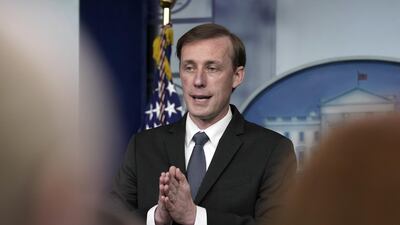US President Joe Biden's National Security Adviser, Jake Sullivan, on Monday defended next week's meeting with Russian President Vladimir Putin as a "vital part" of protecting America's interests.
Mr Biden has been criticised for proposing the June 16 meeting in Geneva, which comes amid allegations of Russian cyber attacks on US companies and institutions, meddling in the US electoral system and aggressive action in Ukraine.
The summit will come at the end of Mr Biden's first international trip as president, which will take him to the UK and then to the first in-person G7 summit since the pandemic began.
He will also visit Brussels for Nato's first summit since 2018 and an EU trade and technology conference.
"We believe President Biden goes on this trip from a position of strength," Mr Sullivan said.
The Biden-Putin meeting is "a vital part of defending America’s interests and America’s values", he said.
Mr Biden will have "the wind at his back" after the Europe meetings, Mr Sullivan said.
He said the summit was not a "reward" for Moscow but an opportunity for the two presidents to seek any common ground.
Mr Sullivan said Mr Biden has invited Ukraine's President Volodymyr Zelenskiy to the White House in July.
Russian forces were built up along the border it shares with Ukraine this year, bringing concerns over further military action.
Kiev has been worried about US solidarity, but Mr Sullivan said the president told Mr Zelenskiy that "he'll stand up firmly for Ukraine's sovereignty, territorial integrity and aspirations" during his meeting with Mr Putin.
Mr Zelenskiy tweeted his thanks.
Nato Secretary General Jens Stoltenberg met Mr Biden later on Monday and confirmed his support for the president's meeting with Mr Putin.
“Dialogue with Russia is not a sign of weakness,” Mr Stoltenberg told reporters at the White House.
"We are strong, we are united and we can talk to Russia and we need to talk to Russia partially to strive for a better relationship. But even if you don’t believe in a better relationship with Russia, we need to manage a difficult relationship.”
Mr Sullivan also confirmed Mr Biden's meeting with Turkey's President Recep Tayyip Erdogan next week on the sidelines of the Nato gathering.
They will discuss issues such as Syria, Afghanistan, the Mediterranean and human rights, the top aide said.
"President Biden knows Erdogan very well," Mr Sullivan said.
"The two men have spent a good amount of time together and they're both, I think, looking forward to the opportunity, to really have a businesslike opportunity to review the full breadth of the relationship."
It will be their first meeting after Mr Biden recognised the Armenian genocide.
Mr Sullivan said ransomware would be a subject Mr Biden would raise in his G7 summit trip, after concerns about an increasing number of Russia-based cyber attacks.
These include sustained attacks on Microsoft and a hack that forced JBS, one of the largest meat producers in the US, to close several production sites.
Another ransomware attack hit the largest oil pipeline on the east coast of the US, which led to panic buying and petrol shortages this spring.
Its operator, Colonial Pipeline, paid the hackers $4.4 million.
At the time, Mr Biden said US agencies did not believe Moscow was behind the attack, but that cyber criminals were operating in Russia.
The US Department of Justice revealed on Monday it had recovered most of the cryptocurrency Colonial had paid to the hackers.
US law enforcement located the virtual wallet to which the Bitcoin had been paid and the FBI recuperated the funds, now at a decreased value because of Bitcoin's volatility.
“Ransomware attacks are always unacceptable but when they target critical infrastructure, we will spare no effort in our response,” deputy US attorney general Lisa Monaco said.

